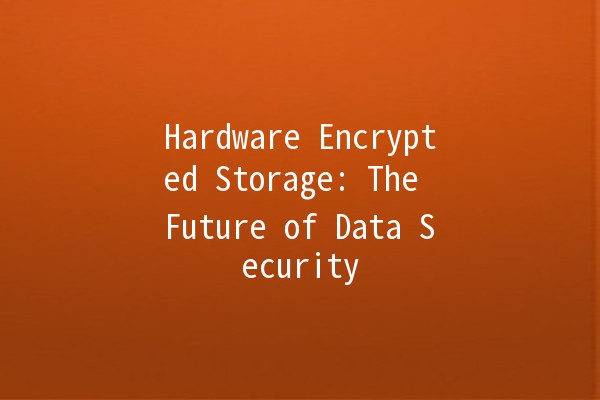
In a digital age where data breaches and cyber threats are rampant, the importance of data security cannot be overstated. Hardware encrypted storage solutions have emerged as a vital shield against unauthorized access, offering an extra layer of protection for sensitive information. This article explores the intricacies of hardware encrypted storage, highlighting its benefits, key features, and practical productivity tips to maximize its usage.
What is Hardware Encrypted Storage?

Hardware encrypted storage refers to storage devices that utilize dedicated hardware to encrypt data. This encryption occurs in realtime as data is written to the device, ensuring that unauthorized users cannot access the stored information without the proper authentication. Unlike software encryption, which relies on the computer’s processor, hardware encryption is integrated directly into the device itself, making it more efficient and secure.
Benefits of Hardware Encrypted Storage
Key Features to Look for in Hardware Encrypted Storage
When selecting a hardware encrypted storage device, keep the following features in mind:
Encryption Standards: Ensure that the device uses robust encryption standards, such as AES (Advanced Encryption Standard) with 256bit keys, which is currently considered the gold standard for data security.
User Authentication: Look for devices that offer multiple forms of user authentication, such as password protection, biometric scanning, or twofactor authentication, to add extra security layers.
Compatibility and Usability: The storage device should be compatible with various operating systems and devices. Additionally, the user interface should be intuitive for easy setup and management.
Backup and Recovery Options: Select devices that provide backup solutions and data recovery options. This feature helps safeguard against data loss caused by hardware failures or other unforeseen circumstances.
Performance Specifications: Evaluate the read/write speeds and overall performance metrics of the device to ensure it meets your usage demands.
Productivity Enhancement Tips for Using Hardware Encrypted Storage
To maximize the effectiveness of hardware encrypted storage devices, consider implementing the following productivity tips:
Tip: Regularly back up critical data to your hardware encrypted storage device to ensure redundancy and security.
Example: Schedule automatic backups using backup software that recognizes the hardware encrypted device. This practice not only protects your data but also ensures that you always have the latest versions stored securely.
Tip: Use encryption management software that facilitates the management of keys and passwords for your encrypted devices.
Example: Implement a centralized encryption management solution that allows administrators to manage encryption keys across multiple devices within a network. This software helps streamline the process of granting, revoking, or changing access permissions as needed.
Tip: Establish access control policies to determine who can access the stored data, limiting exposure to sensitive information.
Example: If working within a team environment, ensure that only relevant team members have access to specific encrypted folders or files. This approach helps minimize data exposure and adheres to data security best practices.
Tip: Conduct regular security audits to assess the effectiveness of your encryption strategies and compliance with data protection regulations.
Example: Create a schedule to review access logs and encryption statuses. This practice will help identify any unauthorized attempts to access the data and ensure that encryption standards are being upheld.
Tip: Train employees on the importance of data security and the proper use of hardware encrypted storage devices.
Example: Implement training sessions that cover topics such as recognizing phishing attempts, securely handling passwords, and the importance of encrypting sensitive data. An informed workforce is essential for maintaining data security.
Common Questions About Hardware Encrypted Storage
Hardware encryption relies on builtin hardware designed to encrypt data, providing more efficient and secure encryption compared to software encryption, which relies on the host system's processor.
Yes, hardware encrypted storage is an invaluable investment for individuals and businesses handling sensitive data. The added security, compliance benefits, and peace of mind can significantly outweigh the initial cost.
While hardware encrypted storage provides robust security, it is still essential to follow best practices for data management and user training. Risks can include human error, theft of the device, or unintentional data loss if not backed up correctly.
Yes, most hardware encrypted storage devices are designed for compatibility with various operating systems and devices. However, it's essential to check the device's specifications regarding compatibility before use.
Hardware encrypted storage is ideal for sensitive data, including financial information, personally identifiable information (PII), intellectual property, and any other confidential business documents.
To maximize the security of your hardware encrypted storage device, implement strong passwords, enable multifactor authentication, and regularly update the encryption software when available. Additionally, maintain regular backups of your data.
The benefits of using hardware encrypted storage are clear, and with the right understanding and practices in place, users can significantly enhance their data security. As technology continues to evolve, embracing these solutions will not only protect valuable information but also foster a culture of data security awareness in workplaces and homes alike.

